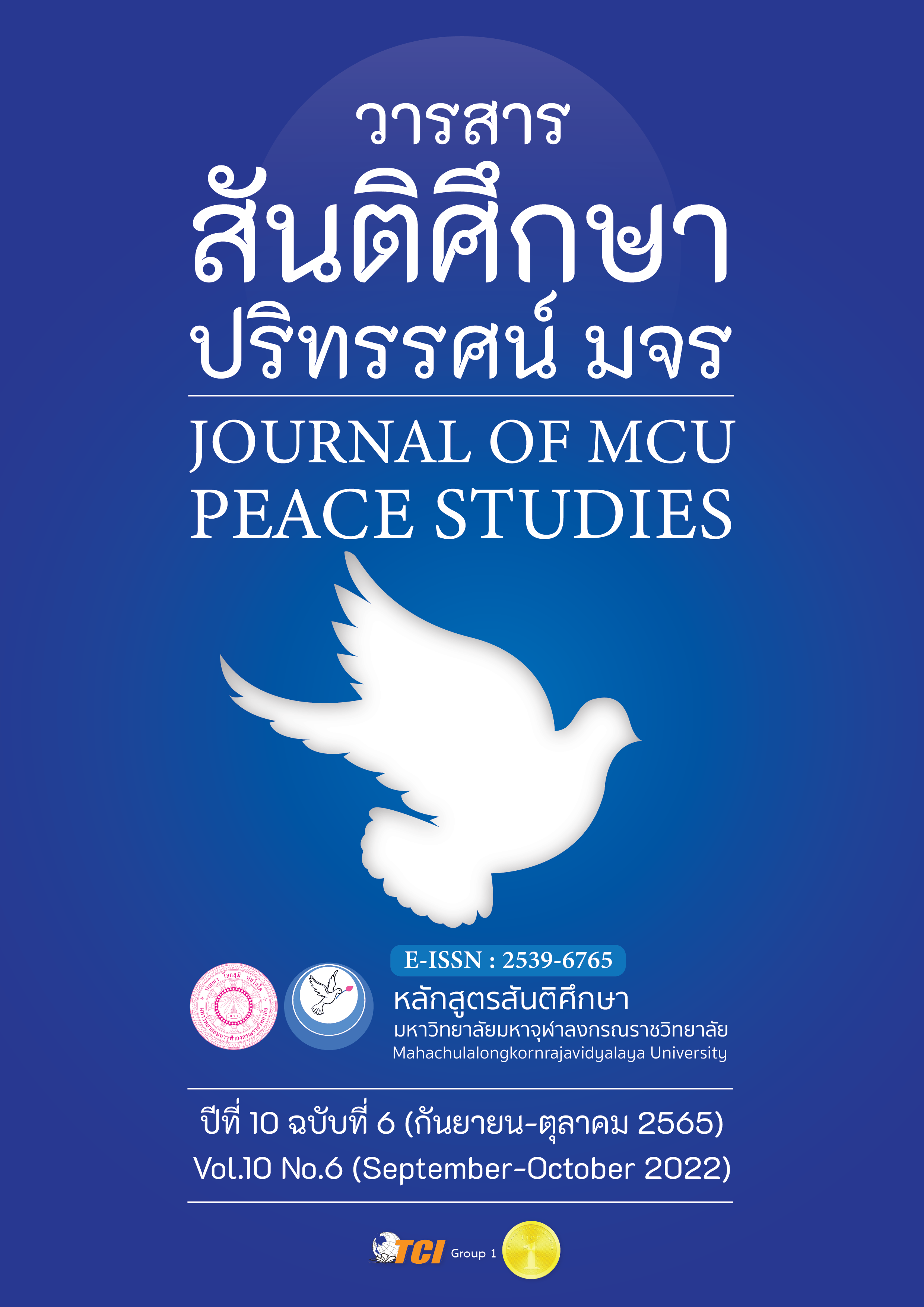สภาพปัจจุบันและความคาดหวังที่มีต่อการบริหารจัดการเพื่อความยั่งยืน ของสมาคมศิษย์เก่าในสถาบันอุดมศึกษา
Main Article Content
บทคัดย่อ
บทความวิจัยนี้มีวัตถุประสงค์เพื่อศึกษาสภาพปัจจุบัน และความคาดหวังที่มีต่อการบริหารจัดการเพื่อความยั่งยืนของสมาคมศิษย์เก่าในสถาบันอุดมศึกษา เป็นงานวิจัยแบบผสมผสาน โดยการสัมภาษณ์เชิงลึกเพื่อการศึกษาสภาพการบริหารจัดการเพื่อความยั่งยืนของสมาคมศิษย์เก่าในสถาบันอุดมศึกษาจากผู้ทรงคุณวุฒิและผู้เชี่ยวชาญ จำนวน 5 คน และทำการวิเคราะห์ข้อมูลหาความต้องการจำเป็นในการบริหารจัดการเพื่อความยั่งยืนของสมาคมศิษย์เก่าในสถาบันอุดมศึกษา โดยการใช้ดัชนีความสำคัญของลำดับความต้องการจำเป็น (Modified Priority Needs Index: PNI) กลุ่มตัวอย่างที่ใช้ในการวิจัย จำนวน 400 ตัวอย่าง ประกอบด้วย ผู้บริหาร คณาจารย์ และบุคลากร จำนวน 100 ตัวอย่าง นิสิต นักศึกษาที่กำลังศึกษาในชั้นปีที่ 4 จำนวน 100 ตัวอย่าง และศิษย์เก่า จำนวน 200 ตัวอย่าง เครื่องมือที่ใช้ในการวิจัย คือ แบบสอบถามความต้องการจำเป็นมีค่าความเชื่อมั่นเท่ากับ 0.894 และแบบสัมภาษณ์เชิงลึก สถิติที่ใช้ในการวิเคราะห์ข้อมูล ได้แก่ ค่าเฉลี่ย ค่าความต้องการจำเป็น และการวิเคราะห์เนื้อหา
ผลการวิจัย พบว่า จากการสัมภาษณ์แบบเชิงลึกสภาพการบริหารจัดการเพื่อความยั่งยืนของสมาคมศิษย์เก่าในสถาบันอุดมศึกษา การบริหารประกอบด้วย ด้านกลยุทธ์ ด้านโครงสร้าง ด้านระบบ ด้านรูปแบบ ด้านบุคคล ด้านทักษะ และด้านค่านิยมร่วม จากการจัดลำดับความต้องการจำเป็นที่มีค่า PNI สูงสุดในด้านกลยุทธ์ คือ สมาคมฯ มีการวิเคราะห์สภาพแวดล้อมเพื่อหาจุดอ่อน และจุดแข็ง และสมาคมฯ มีวางแผนกลยุทธ์ ที่ส่งเสริมการบริหารการจัดการเพื่อความยั่งยืน ด้านโครงสร้าง คือ สมาคมฯ มีการจัดโครงสร้างการบริหารงานที่เหมาะสมต่อการบริหารจัดการเพื่อความยั่งยืน ด้านระบบ คือ สมาคมฯ มีระบบการบริหารจัดการเพื่อรองรับความยั่งยืนที่ชัดเจน ด้านรูปแบบ คือ ผู้บริหารสมาคมฯ มีการทบทวนการดำเนินงานและผลการดำเนินงานในทุกด้านอย่างชัดเจน ด้านบุคคล คือ สมาคมฯ เปิดโอกาสให้บุคลากร และผู้ที่เกี่ยวข้องทุกระดับเข้ามามีส่วนร่วมในการช่วยผลักดันการทำงานให้บรรลุเป้าหมาย ด้านทักษะ คือ มีการฝึกทบทวนผลการปฏิบัติงานของบุคลากรอย่างต่อเนื่อง และด้านค่านิยมร่วม คือ สมาคมฯ มีระบบที่เกิดขึ้น และใช้เป็นแนวทางในการกำหนดพฤติกรรมการมีส่วนร่วมของบุคลากรในสมาคม
Article Details

อนุญาตภายใต้เงื่อนไข Creative Commons Attribution-NonCommercial-NoDerivatives 4.0 International License.
ทัศนะและความคิดเห็นที่ปรากฏในบทความในวารสาร ถือเป็นความรับผิดชอบของผู้เขียนบทความนั้น และไม่ถือเป็นทัศนะและความรับผิดชอบของกองบรรณาธิการ ยินยอมว่าบทความเป็นลิขสิทธิ์ของวารสาร
เอกสารอ้างอิง
Banka, S. N. (2019). Influence of Alumni Association on the Management of Public Universities in the North Central States of Nigeria. International Journal of Innovative Education Research, 7(1), 31–41.
Bauprae, A., Chaiworaporn, C., & Pisitsak., S. (2016). Factors Affecting the Engagement of Graduate Students to Faculty of Tropical, Medicine, Mahidol University. Mahidol R2R e-Journal, 3(1), 124-144.
Epstein, M. J., Buhovac, A. R., & Yuthas, K. (2010). Implementing Sustainability: The Role of Leadership and Organizational Culture. Strategic Finance, 91(10), 41-48.
Iskhakova, L. H., Stefan & Hilbert, Andreas. (2016). An Integrative Model of Alumni Loyalty-An Empirical Validation Among Graduates from German and Russian Universities. Journal of Nonprofit & Public Sector Marketing, 129-163.
Johansson, H. F., Oliver, (2018). Strengthening the Relationship Between Universities and their Graduates: A Case Study and Project on a Swedish University’s Relationship-Building with the Alumni Network. (Master's Thesis). Mälardalen University, Västerås.
Kaplan, R. (2005). How the Balanced Scorecard Complements the McKinsey 7-S Model. Strategy & Leadership, 33, 41-46.
Leklersindhu, S. (2018). Management of Local Administrative Organizations in Central Province. Journal of Humanities and Social Sciences Thonburi University, 12(28), 41-51.
Likert, R. (1932). A Technique for the Measurement of Attitudes. Archives of Psychology, 22(140), 55.
Meekleub, A., Chanvichai, K., & Viranggorn, J. (2017). The State-of-the-Art Communication Management for Developing Alumni’s Engagement in Public Universitiesof Thailand. Journal of Naresuan University, 12(1), 163-177.
Niemann, B. S. A. L. (2013). Strategic Role of Public Relations in Enterprise Strategy, Governance and Sustainability-A Normative Framework. Science Direct Volume, 40(2), 171-183.
Office of the Education Council. (2017). Global Education Monitoring Report: Thailand Highlights 2017/2018. Bangkok: Prigwan Graphic Co. Ltd.
Office of the Higher Education Commission. (2018). Higher Education Plan (2018-2037). Bangkok: Prigwan Graphic Co. Ltd.
Ponsayom, N., & Jasing, A. (2015). Development of Online Alumni System for Computer Technology and Communication Program. Journal of Information Technology Management and Innovation Rajabhat Maha Sarakham University, 2(1), 65-71.
Pothiyadath, R., & Wesley, J. R. (2014). Developing a Measurement Scale for 7-S Framework. IOSR Journal of Business and Management (IOSR-JBM), 16(1), 14-16.
Roza, S. (2018). Alumni Associations in Kazakhstan: Building the Future of Higher Education Institutions Through Its Graduates. (Master’s Thesis). Nazarbayeb University. Nur-Sultan City.
Saenkham, T., Jeewattana, S., & Pimklad, N. (2017). The Development of Buriram Rajabhat University Alumni Website. Journal of Information Technology Management and Innovation, 4(2), 142-150.
Saohong, S. (2017). Engagement of the Graduate Students in the Regular Program at Education Institution for Graduate Students. SDU Research Journal, 13(1), 75-89.
Simachokedee, W. (2010). TQM Corporate Development Guide for Excellence: 2000. Bangkok: TPA Publishing.
Whattananarong, K. (2011). Educational Technology and Innovation. (2nd ed.). Bangkok: King Mongkut’s Institute of Technology North Bangkok.
Wongwanich, S. (2007). Needs Assessment Research. Bangkok: Chulalongkorn University Press.


